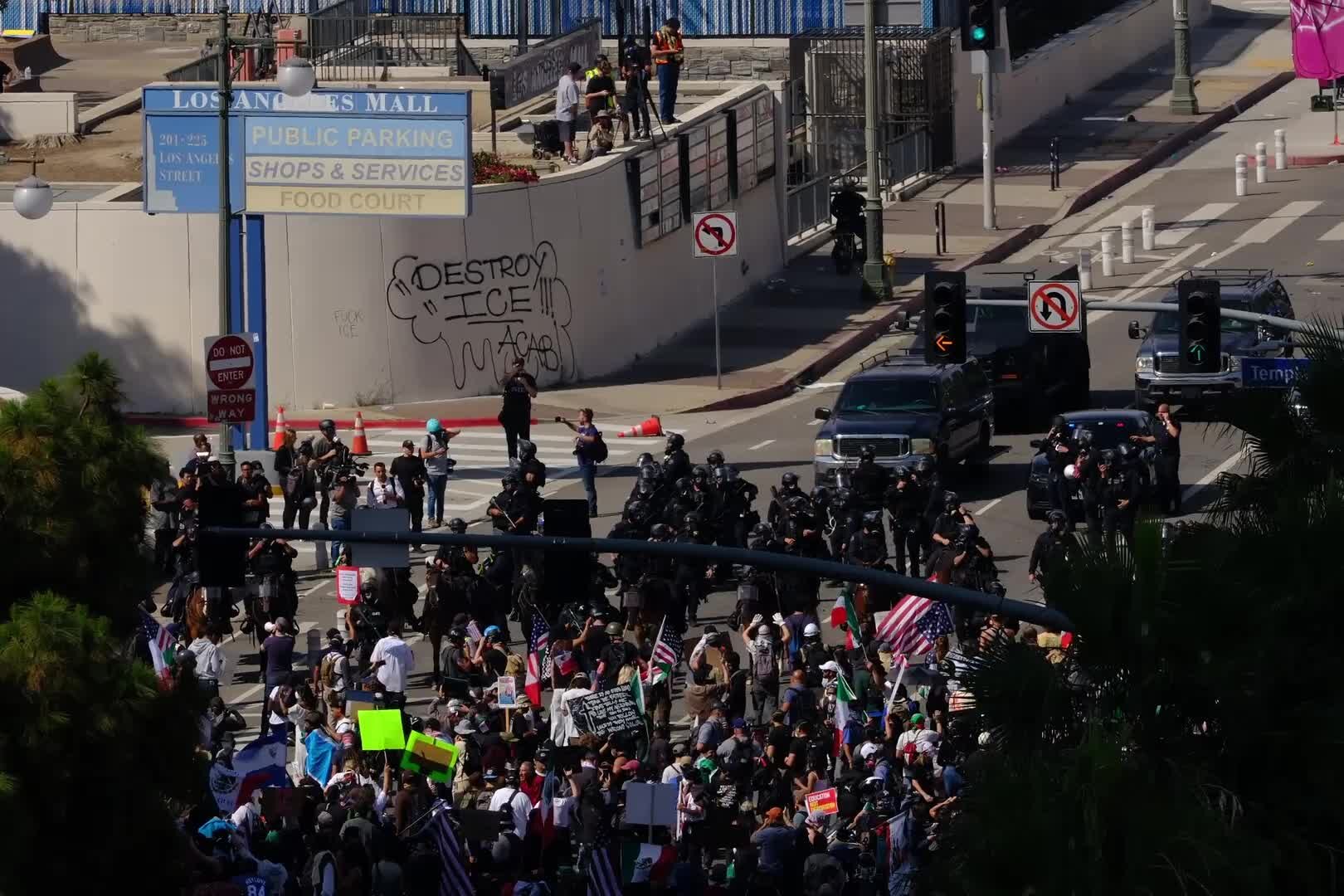Articles in this Cluster
14-06-2025
A federal appeals court temporarily blocked a judge’s order requiring the Trump administration to return control of California’s National Guard to Governor Gavin Newsom, allowing federally controlled troops to remain in Los Angeles during ongoing protests tied to immigration raids. Earlier, Judge Charles Breyer ruled Trump’s deployment illegal under laws governing National Guard authority, but stayed his order to allow an appeal. The administration argues it acted under a law permitting federalization during a “rebellion,” while California contends the protests do not meet that threshold. A hearing is set for Tuesday.
Entities: Donald Trump, California National Guard, Gavin Newsom, Los Angeles, Judge Charles Breyer • Tone: analytical • Sentiment: neutral • Intent: inform
14-06-2025
ICE raids in Oxnard, California, have intensified, prompting undocumented farmworkers—who make up the majority of California’s agricultural labor force—to hide in fields and stay home, fearing arrest. Activists report agents visiting multiple farms without warrants and arresting people on nearby streets, with 35 detained in one day. The crackdown, part of President Trump’s push to detain 3,000 undocumented immigrants daily, is causing labor shortages, idled equipment, and ripple effects on local businesses like restaurants and suppliers. While Trump has acknowledged the harm to farmers and floated limited work authorizations requiring employer recommendations and departure from the U.S., uncertainty and fear persist, with workers avoiding public spaces and even immigration-related court visits. Critics say the raids are indiscriminate and politically driven, raising concerns about food supply disruptions and community stability.
Entities: Oxnard, California, ICE (U.S. Immigration and Customs Enforcement), undocumented farmworkers, California agriculture, President Donald Trump • Tone: urgent • Sentiment: negative • Intent: inform
14-06-2025
Historians say the U.S. is experiencing a uniquely volatile moment marked by multiple simultaneous crises—domestic protests over immigration raids and National Guard deployments, a militarized parade in Washington for the Army’s 250th birthday, and an escalating Middle East conflict after Israeli strikes on Iran and Iranian missile retaliation. They argue that unlike past presidents who sought to calm the nation during turmoil, President Trump is intensifying tensions, deploying additional forces and threatening protestors ahead of his parade. Analysts contend Trump’s confrontational approach, alongside a destabilized global order, heightens national anxiety. The article also notes Trump’s mixed messaging on immigration affecting seasonal worker visas he has long relied on, and highlights his preference for military spectacle, including a highly staged Fort Bragg visit and the forthcoming parade.
Entities: United States, President Donald Trump, National Guard, Israeli–Iran conflict, immigration raids • Tone: analytical • Sentiment: negative • Intent: analyze
14-06-2025
Mass anti-Trump demonstrations under the “No Kings” banner unfolded across all 50 states, driven by opposition to immigration raids, spending cuts, and a Washington military parade on Trump’s 79th birthday. Most events were peaceful and patriotic in tone, though scattered clashes and arrests occurred in cities including Los Angeles, Austin, Charlotte, Pittsburgh, Atlanta, and San Antonio, with some counterprotester incidents in Ohio and Virginia. Los Angeles saw the most tension: police used tear gas, “less-lethal” munitions, and horseback units to disperse crowds near federal buildings ahead of an 8 p.m. curfew, citing projectiles thrown at officers. National Guard troops and U.S. Marines were deployed by President Trump over state objections; a federal judge ruled the deployment illegal, but the decision is stayed until Tuesday. By late evening, most L.A. protesters had left downtown, leaving largely quiet streets. Rallies also honored the assassinated Minnesota state lawmaker Melissa Hortman, amid security threats that disrupted events in Texas and Minnesota.
Entities: Donald Trump, Los Angeles, No Kings, National Guard, U.S. Marines • Tone: urgent • Sentiment: negative • Intent: inform
14-06-2025
U.S. Marines briefly detained a 27-year-old Army veteran, Marcos Leao, outside the Wilshire Federal Building in Los Angeles after he ducked under caution tape while trying to enter a VA office. He was quickly released and said he was treated fairly. The incident, unusual because federal troops rarely detain civilians on U.S. soil, occurred amid heightened tensions over the Trump administration’s deployment of Marines and National Guard to quell protests sparked by immigration raids. Legal questions center on the Posse Comitatus Act and the Pentagon’s claim that Title 10 allows temporary detentions to protect people and property. L.A.’s police chief said he was unaware of the detention and criticized the military deployment as a logistical challenge. Courts are weighing the legality of mobilizing the California National Guard as large demonstrations continue.
Entities: U.S. Marines, Marcos Leao, Wilshire Federal Building, Los Angeles Police Department, Posse Comitatus Act • Tone: analytical • Sentiment: neutral • Intent: inform
14-06-2025
The Trump administration has paused most ICE worksite raids and arrests in agriculture, hotels, and restaurants, responding to industry backlash and concerns that mass deportations were disrupting key labor forces. An internal ICE email instructed agents to halt operations in these sectors and avoid arresting noncriminal undocumented workers, while allowing investigations tied to crimes like trafficking or money laundering to continue. The shift follows protests and Trump’s acknowledgment that enforcement was hurting farmers and hospitality businesses. The move surprised agents amid pressure from the White House to increase daily arrests, and it remains unclear how broadly the new guidance will be applied to other industries.
Entities: Trump administration, ICE, worksite raids, agriculture sector, hospitality industry • Tone: analytical • Sentiment: neutral • Intent: inform
